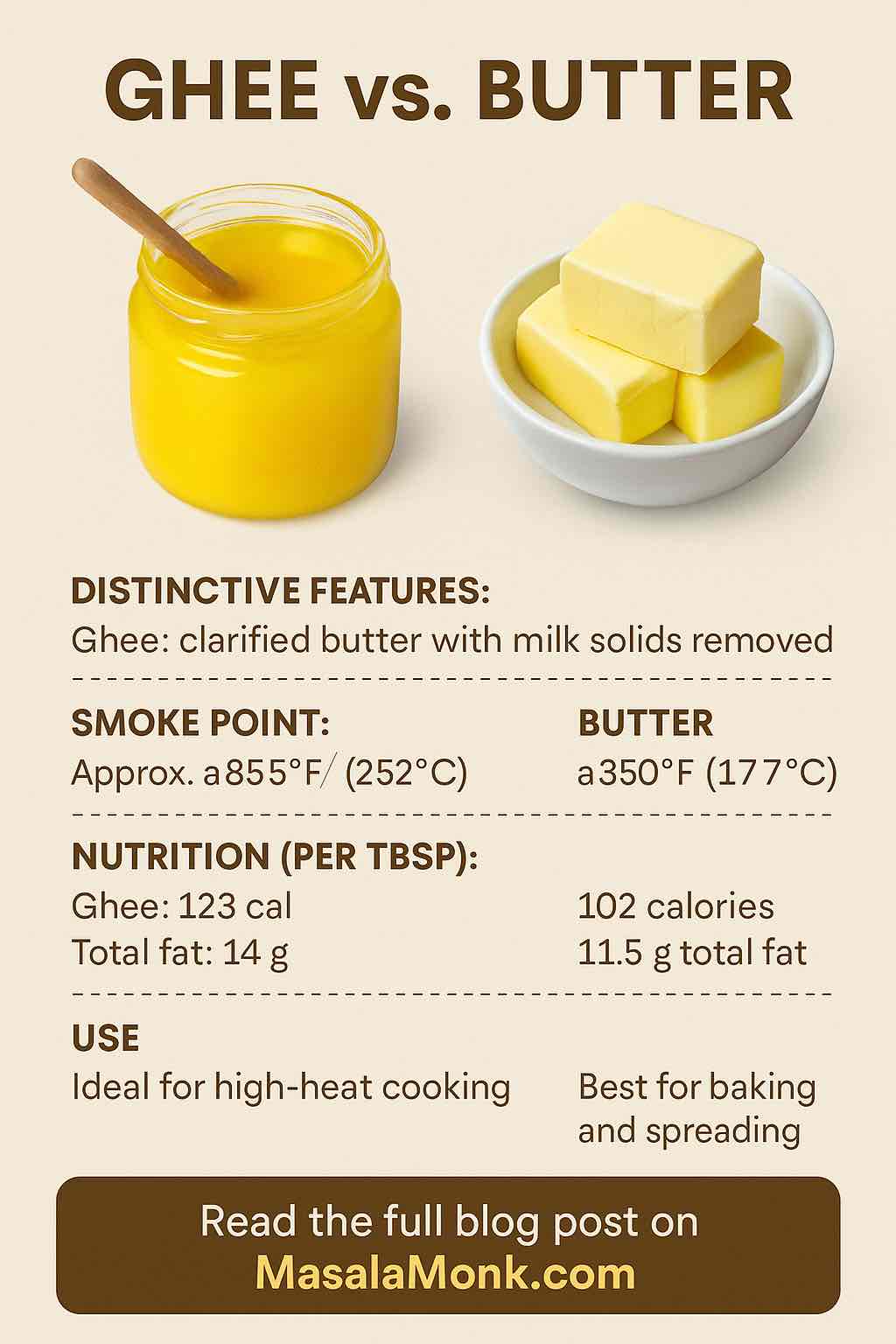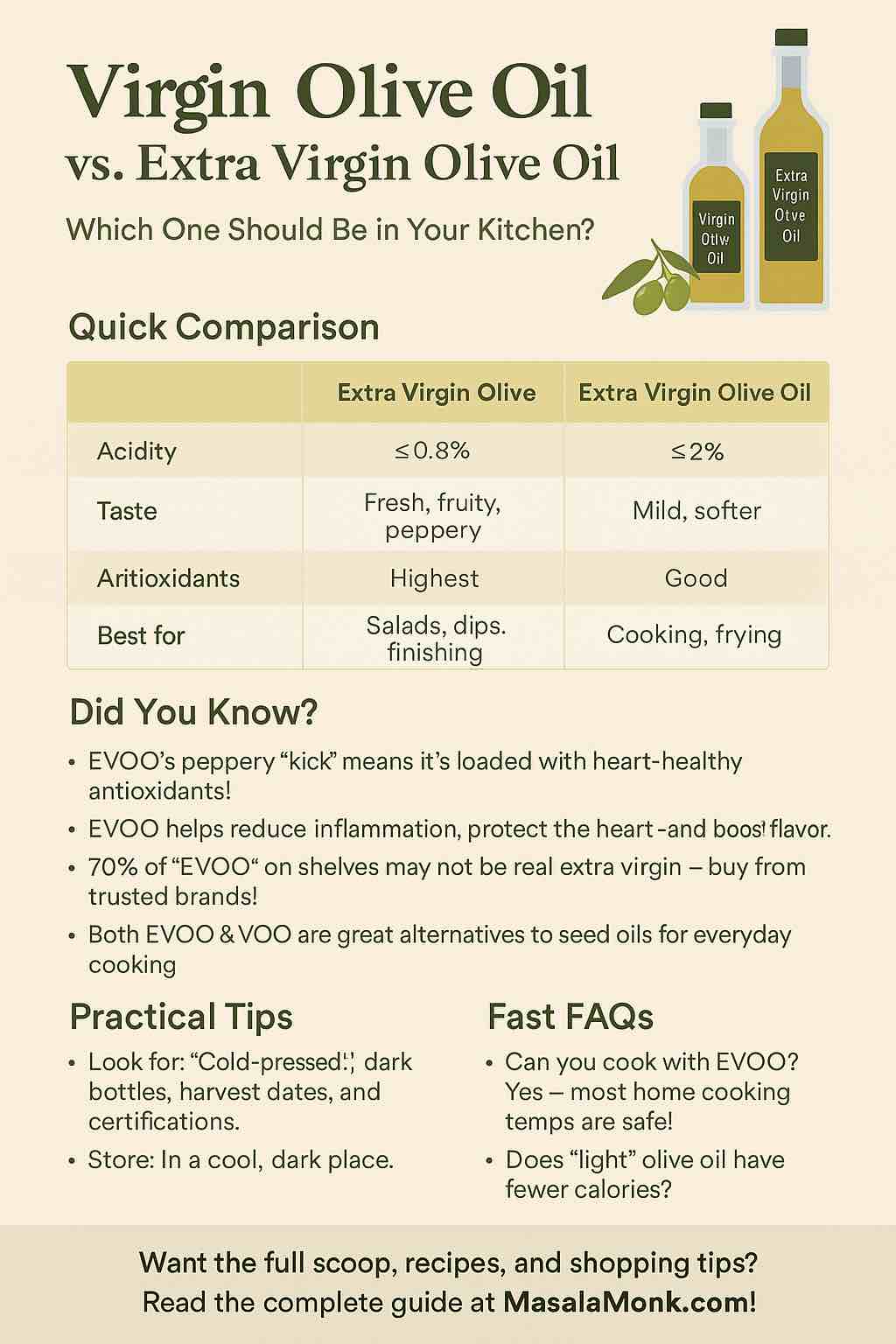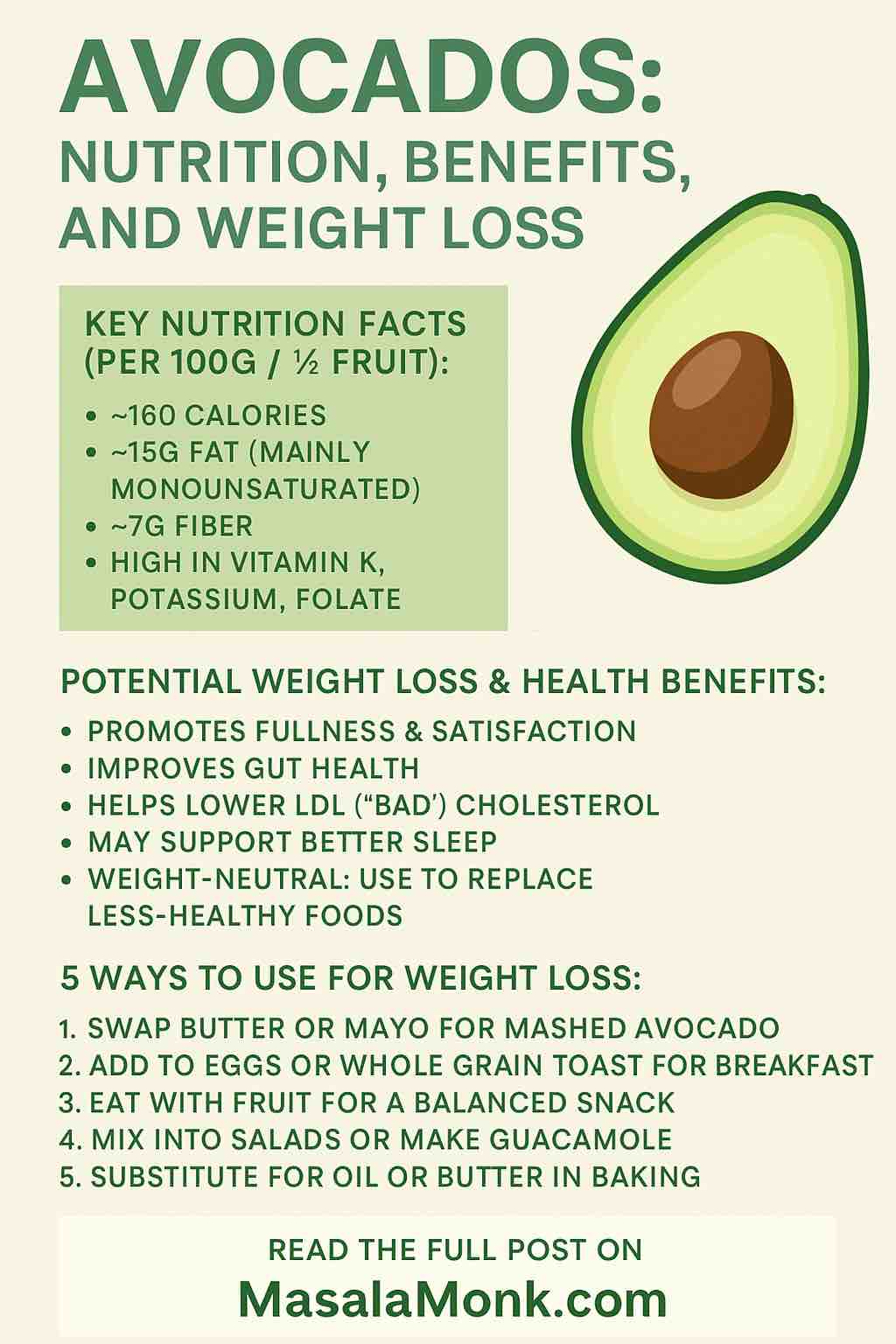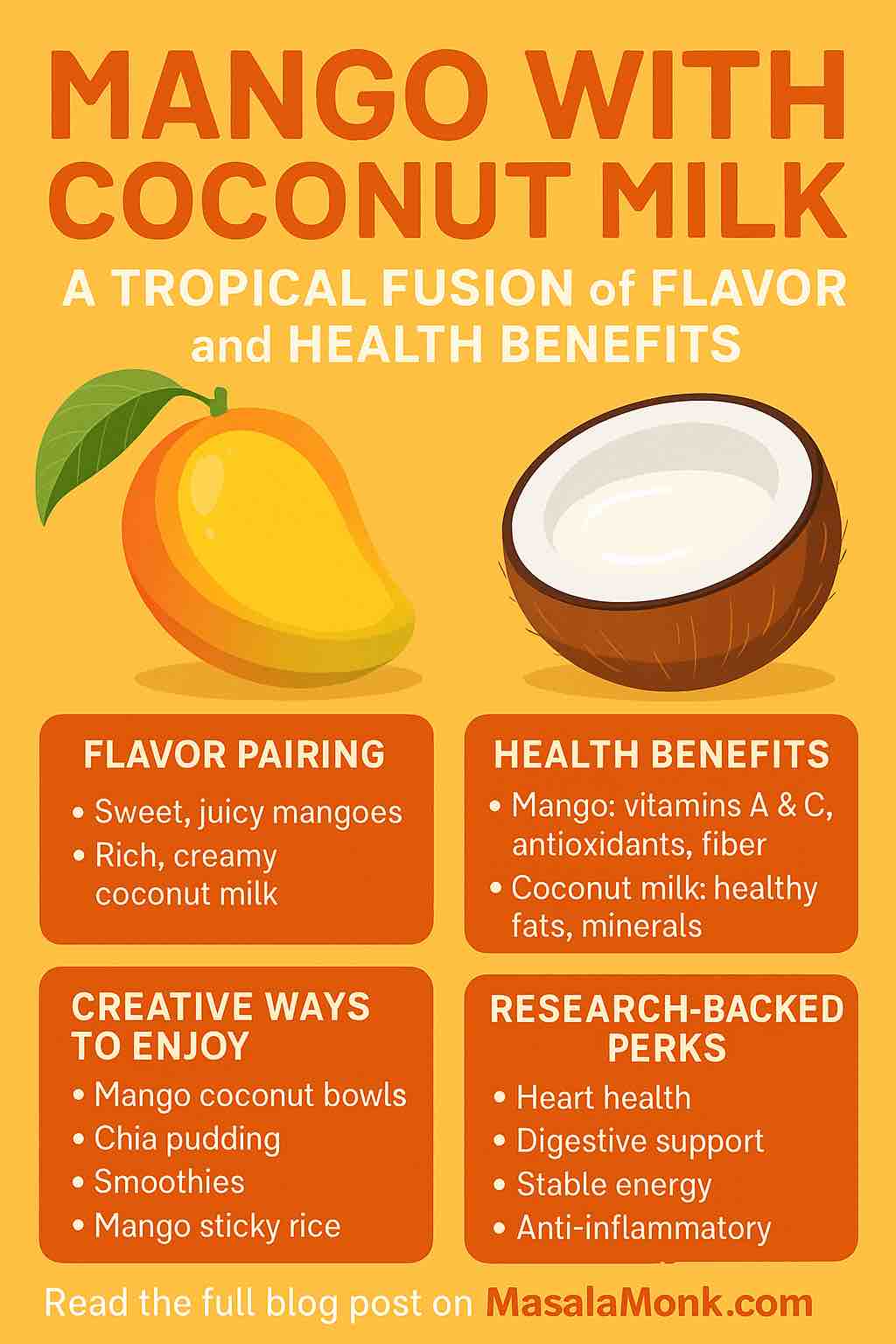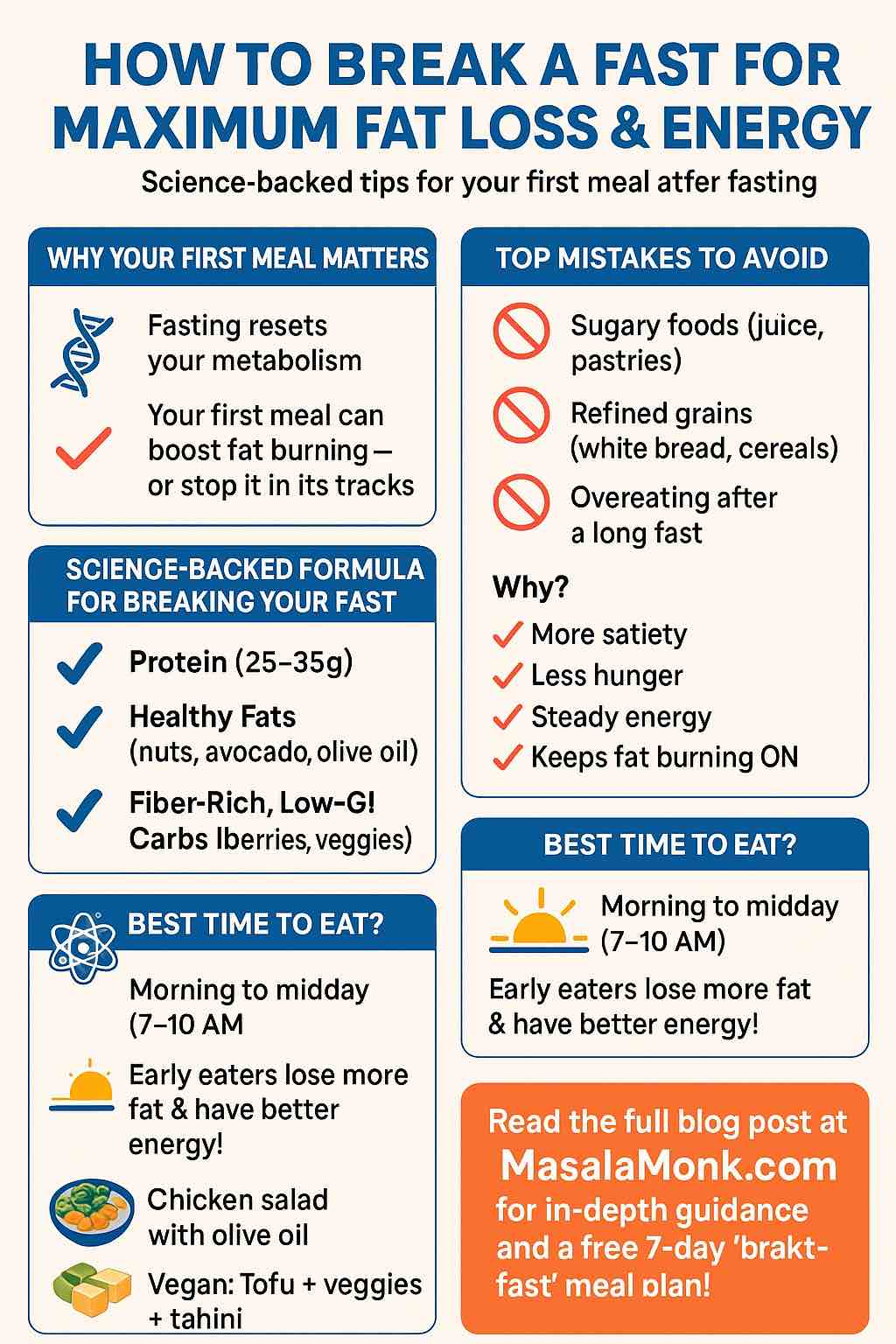
Intermittent fasting has swept the health and fitness world in recent years—and for good reason. Study after study demonstrates that time-restricted eating and fasting can help with fat loss, metabolic health, cognitive function, and even longevity. But here’s a question that stumps even seasoned fasters:
“What’s the BEST way to break my fast for maximum fat loss and all-day energy?”
If you’ve ever agonized over this—or if you’ve ever felt weirdly sleepy, bloated, or ravenous after a meal that was supposed to leave you energized—you’re not alone. The truth is, how you break your fast matters just as much as when you fast. The latest research shows that your first meal after fasting can “set the tone” for your metabolism, fat burning, and energy for the rest of the day.
In this detailed guide, we’ll dive deep into the science and practice of breaking a fast for optimal fat loss and sustained energy. You’ll learn what actually happens in your body during a fast, which foods and combinations are best, common mistakes to avoid, and get real-life meal examples you can try today.
Section 1: The Science of Fasting—Why Breaking the Fast Matters
When you fast—whether it’s a simple overnight fast, intermittent fasting (like 16:8 or 18:6), or even an extended fast—your body undergoes major metabolic shifts:
- Glycogen stores are depleted, and your body begins to mobilize fat for fuel.
- Insulin levels drop, making your body more insulin-sensitive (a good thing for fat loss).
- Autophagy (cellular cleaning) ramps up, especially after 16–24 hours.
But when you break your fast, your body becomes like a sponge—primed to absorb nutrients, restore glycogen, and recalibrate your metabolism for the hours ahead. The type of food you eat first can either:
- Sustain fat burning and stable energy, or
- Trigger a sharp blood sugar spike, leading to fatigue, hunger, and fat storage.
Why the First Meal is Critical
Research in 2025 confirms that:
- The composition of your first meal after fasting determines your insulin and glucose response for hours.
- Early time-restricted eating (eating more calories earlier in the day) leads to greater fat loss and metabolic benefits compared to late-night eating .
- Protein and fat, consumed first, can dampen blood sugar spikes and keep you in a “fat-burning” mode longer .
Section 2: The Biggest Mistakes People Make When Breaking a Fast
Before we get practical, let’s bust a few myths and mistakes:
Mistake 1: Eating High-Sugar Foods or Juices First
Your gut and metabolism are sensitive after fasting. Starting with sweet foods, refined carbs, or fruit juices causes rapid glucose absorption, which spikes insulin and halts fat burning.
Mistake 2: Overeating or Bingeing
Many people feel ravenous after fasting and overdo it. Research shows this can cause bloating, GI distress, and a crash in energy as your body struggles to process a large meal all at once.
Mistake 3: Breaking Fast with “Fast” Foods
Ultra-processed foods (bars, pastries, “breakfast cereals”, etc.) are tempting but often loaded with sugar, unhealthy fats, and additives that sabotage metabolic health.
Mistake 4: Ignoring Protein and Healthy Fats
Meals that are too carb-heavy (even healthy carbs) can leave you hungry again soon. Protein and fats are key for satiety and energy.
Section 3: Research-Backed Principles for Breaking a Fast
Let’s translate the latest science into practical, simple rules:
1. Start with Protein
- Protein triggers a lower insulin response than carbs, supports muscle maintenance, and signals satiety to your brain.
- 2024–2025 studies show that 25–35g of high-quality protein in your first meal after fasting can help maintain lean mass while promoting fat loss.
2. Add Healthy Fats
- Healthy fats (avocado, nuts, olive oil, fatty fish, seeds) help slow the absorption of nutrients and keep blood sugar stable.
- They also provide longer-lasting energy, especially when you’re still using fat for fuel.
3. Include Fiber-Rich, Low-Glycemic Carbs
- Fiber slows digestion and helps avoid sharp glucose spikes.
- Low-GI carbs—like berries, leafy greens, legumes—support gut health and provide steady energy.
4. Sequence Meals Properly
- After longer fasts (20+ hours), start gently: bone broth, a few nuts, or a small protein portion.
- Wait 15–30 minutes, then eat a full, balanced meal.
5. Hydrate and Replenish Electrolytes
- Water, herbal tea, or a pinch of sea salt can help offset any dehydration from fasting.
- Especially important after 16+ hour fasts.
Section 4: What the Latest Research (2024–2025) Says
Let’s dig into new findings:
A. Intermittent Fasting Works—But Meal Timing is Key
A 2025 Annals of Internal Medicine study found that people practicing 4:3 fasting (three “fasting” days a week) lost more weight and improved their blood pressure, cholesterol, and glucose than those simply cutting daily calories . Interestingly, adherence (how well people stuck to the plan) was higher in the fasting group.
B. Early Eating Windows Enhance Fat Loss
Multiple studies (Spain, Iran, UK) confirm that eating most of your calories before 3–4 PM boosts fat loss, insulin sensitivity, and even mood .
C. Protein & Fat for Stable Energy
Research published in Nutrients (June 2025) demonstrates that starting your eating window with protein and fat (instead of just carbs) reduces the risk of reactive hypoglycemia (blood sugar crashes) and increases satiety throughout the day.
D. Fasted Exercise = More Fat Burn
A May 2025 clinical trial shows that people who work out in a fasted state (especially morning) burn more fat and have better triglyceride responses post-meal.
Section 5: Practical Steps—How to Break a Fast for Fat Loss & Energy
Let’s pull it all together. Here’s a step-by-step process you can follow, whether you’re fasting for 14 hours or doing occasional 24-hour fasts.
Step 1: Hydrate
- Drink 8–16 oz (250–500 ml) of water upon waking and before your first meal.
- Add a pinch of Himalayan salt or electrolyte powder if you’ve been fasting longer than 16 hours.
Step 2: Ease In (For Long Fasts)
- If you fasted 20+ hours, start with something gentle:
- A cup of bone broth
- A few almonds or walnuts
- 1 boiled egg
Step 3: Build Your Main Meal
- Protein (25–35g):
- 3–4 eggs
- Greek yogurt or cottage cheese (unsweetened)
- Chicken, turkey, fish, or tofu
- Healthy Fat (15–25g):
- 1/2 avocado
- 1–2 tbsp olive oil
- A small handful of nuts
- Fiber/Low-GI Carbs (10–20g):
- 1 cup berries
- 2 cups spinach, kale, broccoli, or other non-starchy vegetables
- 1/2 cup legumes (chickpeas, black beans) if tolerated
Optional: Add fermented foods (sauerkraut, kimchi, kefir) for gut health.
Step 4: Eat Slowly, Chew Well
Your digestive system is “waking up” after a break—give it time to signal fullness.
Step 5: Monitor Your Energy and Hunger
- You should feel satisfied but not stuffed.
- Energy should remain steady for 3–5 hours after eating.
Section 6: Sample Meal Ideas to Break Your Fast
Example 1: The “Power Plate”
- 3 eggs scrambled with spinach and tomatoes (protein + fiber)
- 1/2 avocado (healthy fat)
- Small bowl of berries (low-GI carbs)
- Sprinkle of pumpkin seeds (extra minerals and crunch)
Example 2: Savory Yogurt Bowl
- 1 cup Greek yogurt (unsweetened, high protein)
- 1 tbsp chia seeds + 1 tbsp walnuts (fiber & fat)
- 1/2 cup mixed berries
- Dash of cinnamon and a sprinkle of salt
Example 3: Simple Lunch-Style Break-Fast
- 4 oz grilled chicken breast
- 1–2 cups mixed salad greens + cherry tomatoes, cucumber, bell pepper
- 2 tbsp olive oil vinaigrette
- Small handful of almonds
Example 4: Vegan/Plant-Based
- 1 cup cooked lentils with sautéed kale and red onion
- Drizzle of tahini
- Side of fresh orange slices or berries
Section 7: Foods to Avoid When Breaking a Fast
- Sugary foods and drinks: Fruit juice, sweetened yogurt, pastries, candy.
- Refined grains: White bread, white rice, most breakfast cereals.
- Ultra-processed snacks: Chips, bars, crackers made with refined flour and oils.
- Large fatty meals: (especially if fasting >24 hours) Too much fat can cause GI upset; add fats gradually.
- Alcohol: Rapidly absorbed after fasting, impairs metabolism.
Section 8: What About Coffee, Supplements, and Other Diets?
Can I break my fast with coffee?
- Black coffee is fine during a fast and won’t break it. To break your fast, pair coffee with a protein-rich meal or add a splash of unsweetened milk/cream.
Should I take supplements when breaking a fast?
- Magnesium, potassium, and sodium are helpful if you fast >16 hours.
- Multivitamins can be taken with your meal for best absorption.
What if I’m keto, paleo, or plant-based?
- The same principles apply! Focus on protein, healthy fats, and fiber.
- For keto: Stick to leafy greens and low-carb veggies; avoid grains/legumes.
- For plant-based: Choose tofu, tempeh, lentils, beans as protein; add nuts and seeds for fat.
Section 9: Myth-Busting—Breaking a Fast
Myth: “Any calorie breaks my fast.”
Fact: Most metabolic benefits of fasting (fat burning, autophagy) aren’t reversed by a few calories—especially from protein or fat. However, carbs (especially sugar) rapidly end the fasted state.
Myth: “Fasting means skipping breakfast.”
Fact: Breakfast just means “breaking the fast”—the time of day is less important than the quality and timing of your first meal.
Myth: “Fruit juice is a healthy way to break a fast.”
Fact: Juice is mostly sugar with little fiber; it spikes blood sugar and halts fat burning.
Section 10: The Takeaway—A Simple Action Plan
To break your fast for optimal fat loss and sustained energy:
- Hydrate first.
- Prioritize protein (25–35g in your first meal).
- Add healthy fats for satiety and slow energy.
- Choose low-GI, fiber-rich carbs (berries, greens, legumes).
- Eat most calories earlier in the day—avoid late-night meals.
- Move your body—try a fasted morning walk or workout.
- Monitor your body—adjust portions and macros to your energy and hunger.
Section 11: Your Next Steps—A Week of Break-Fast Meals
To make it easy, here’s a simple 7-day “break-fast” meal plan you can rotate:
| Day | Meal Example |
|---|---|
| Monday | 3 eggs + spinach, tomato, olive oil + ½ avocado + berries |
| Tuesday | Greek yogurt + chia + walnuts + berries + sprinkle of hemp seeds |
| Wednesday | Tofu scramble + kale + bell pepper + salsa + ½ avocado |
| Thursday | Chicken breast + arugula salad + olive oil + pumpkin seeds |
| Friday | Cottage cheese + sliced cucumber + olive oil + cherry tomatoes |
| Saturday | Lentil stew + broccoli + tahini drizzle |
| Sunday | 2 boiled eggs + small apple + almond butter |
Adjust portion sizes for your goals and preferences.
Conclusion
Fasting can be a powerful tool for fat loss, health, and focus—but only if you break your fast wisely. New science shows the first foods you eat matter: protein, healthy fats, and fiber-rich carbs help you sustain energy, avoid hunger, and keep burning fat all day long.
Start slow, choose real foods, and listen to your body. The results? More energy, better moods, and—if that’s your goal—sustained, healthy fat loss.
Ready to try it? Let me know your favorite “break-fast” meal or questions in the comments!
If you enjoyed this post, share it with your friends—or try one of the meals above and tag us with your results!
10 Frequently Asked Questions (FAQs)
1. What should I absolutely avoid when breaking a fast?
Avoid sugary foods (like juice, pastries), refined grains (white bread, most cereals), and ultra-processed snacks. These spike your blood sugar, trigger hunger, and halt fat burning.
2. Is it okay to break a fast with fruit?
Whole fruit is better than fruit juice, but keep portions small and combine with protein/fat to blunt blood sugar spikes. Berries or half an apple with nuts or Greek yogurt work well.
3. Can I drink coffee or tea while fasting or to break my fast?
Black coffee and unsweetened tea are fine during fasting. To break your fast, enjoy them with your meal, but avoid adding sugar or high-calorie creamers.
4. How much protein should I aim for in my first meal after fasting?
Aim for 25–35 grams of high-quality protein (about 3–4 eggs, 1 cup Greek yogurt, or a palm-sized portion of meat/fish).
5. Should I eat carbs in my first meal after fasting?
Include low-glycemic, fiber-rich carbs like berries, legumes, or vegetables. Avoid high-sugar or starchy carbs when breaking your fast.
6. Can I break a fast with a workout shake or bar?
Most commercial shakes and bars are high in sugar and low in nutrients. If using, choose one with no added sugars, moderate protein, and healthy fats.
7. What’s the best time of day to break my fast?
Early morning to midday (e.g., 7–10 AM) aligns best with your body’s circadian rhythms and supports optimal fat loss and energy.
8. What if I feel weak or dizzy after breaking a fast?
This may be due to dehydration or rapid blood sugar changes. Hydrate before eating, eat slowly, and ensure you include some healthy fats and protein.
9. How can I break a fast if I follow a vegan or plant-based diet?
Opt for tofu, tempeh, lentils, beans, nuts, and seeds for protein and fat. Pair with leafy greens or non-starchy vegetables.
10. Will breaking my fast with fat (like bulletproof coffee) keep me in fat-burning mode?
Adding only fat (e.g., butter/MCT oil in coffee) provides energy but doesn’t offer protein or fiber. For best results, combine fats with protein and fiber for satiety and metabolic health.

